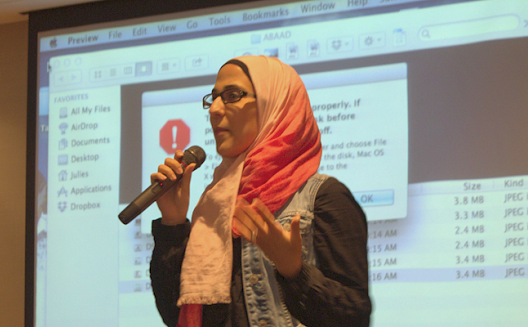Why the Arab world needs more women in the workforce


When female participation in the workforce in the Arab world
still ranges between 17% and 27% of the female population,
something has to change.
In Abu Dhabi, Tamakkan, an
NGO that offers seminars to entrepreneurs, is hoping to usher
in that change. Its recent talk, titled “The Rise of Women
Entrepreneurship – Vision and Innovation” brought women together-
both Emirati and non-Emirati women, as well as men- to
address major challenges still facing women entering the workforce.
Featuring discussions with women entrepreneurs, the seminar touched on the potential for women’s employment to rebuild economies. In Egypt, for example, Strategy& estimates that female participation in the workforce could boost GDP by 34%.
“We see a lot more women feeling empowered now than we did when we started back in 2009,” says Tamakkan’s CEO Sana Bagersh. She adds that the untapped potential of women-owned firms and women-led innovations is equivalent to the discovery of an entirely new technology or the birth of an entire industry.
Breaking through stereotypes and creating collaborative cultures are also important for fostering innovation and leadership, said speaker Jane Samson, Managing Partner of True Evolution, “Abu Dhabi is almost half way towards its 2030 vision, and we need to think ‘who are the people who will actually make that happen?’” she asks. “We work in a whole ecosystem. It is not just one team, it is a combinations of different teams; we all have to be able to work collaboratively.”
Another part of the solution is supporting working mothers and "mompreneurs," said Theresa Weber, Cofounder of Alexandria Consulting team (ACT), touching upon arguments from Sheryl Sandberg's popular book "Lean In."
Although women make up the majority of college graduates and those seeking employment, she explained, they only occupy one third of middle management positions, and only 5% of CEO-level positions globally. Like Sandberg, Weber argued that women must make themselves more visible, instead of waiting to be noticed by their managers or employers.
She noted a study by McKinsey (which we've also cited in our Wamda for Women roundtables) that demonstrates that women are promoted based on past accomplishments, while men are often promoted based on their potential. Women are just as ambitious as men, said Weber, but often have more challenges, such as raising children, to overcome throughout their career.
To address some of these barriers, Weber argued that the most important thing men can do to help women succeed is to take on more responsibility at home, while women should take the time to find a strong mentor as they go on their journey.
Loulou Khazen, the founder of Nabbesh.com, an online portal that connects individuals and freelancers with project-based opportunities, offered up the story of her own journey as an entrepreneur, explaining that her original motivation for launching Nabbesh in 2012 was to provide a solution for unemployed women. Just last year, Nabbesh won The Entrepreneur competition by Du, and has created a database of 15,000 freelancers and employers, with 250 new jobs posted each month.
Rounding out the event, two poets, Ethar El Tinay and Charlis Cunningham, offered up their take on challenges facing women in the region.
As the discussion at this Tamakkan seminar showed, women still have an uphill climb to reach gender parity in the workplace. But they have no less ambition or potential to create new innovations and jobs for the region.
I, for one, was inspired by the presenters throughout the event who offered a call to action for women and other stakeholders in the UAE and the region to push for more equal opportunities for women in the Arab world.
Wamda for Women Entrepreneurs (W4Women) will also be continuing its series of roundtable discussions across the region, addressing very similar themes and leading discussions about the stereotypes women face, the role models they look up to, how societies can optimize work/life balance, and how women can succeed in finding funding and negotiating. To learn more about a roundtable near you, check out the W4Women page here.


